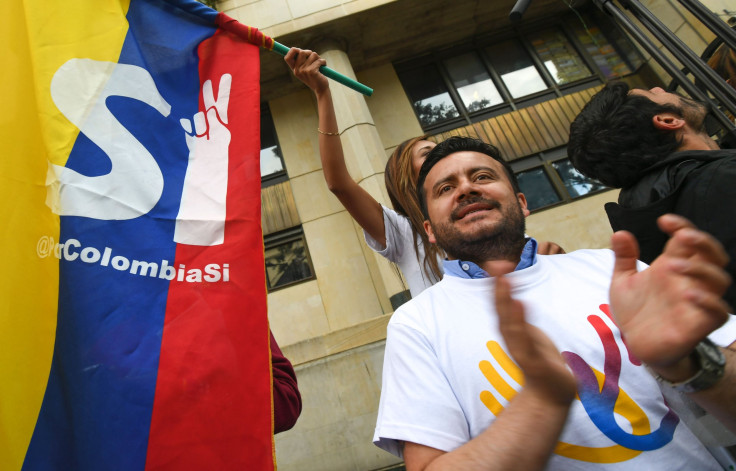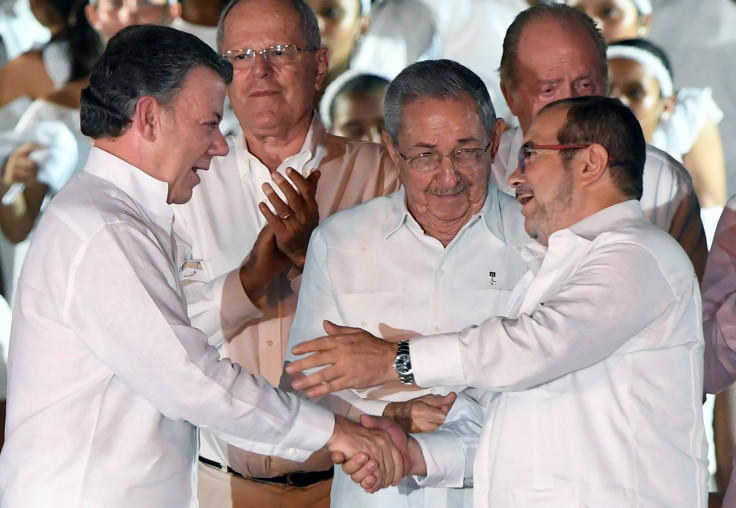Colombia Referendum 2016 Explained: Will Colombians Vote For Peace Deal With FARC To End 52 Years Of War?

Colombians will go to the polls Sunday to decide whether to ratify a peace deal to bring an end to the world’s longest continuous armed conflict. Earlier this week, Colombian president Juan Manuel Santos and commander of the leftist-rebel group the Revolutionary Armed Forces of Colombia (FARC), Timochenko, signed a peace agreement in Cartagena to signal the ceasing of a war that has raged for 52 years.
But one obstacle remains if years of negotiations are to pay ultimate dividends. Fulfilling a promise Santos made when formal peace talks began in 2012, the deal will be put before the Colombian people, an estimated 34 million voters, on Sunday with a plebiscite to decide whether it goes into effect. The “Yes” vote is expected to come out on top, with latest opinion polls suggesting it has the support of two-thirds of voters. But, as the Brexit referendum in the United Kingdom showed earlier this year, such public votes can throw up surprising outcomes.
There is opposition to the accord. The "No" camp has significant voices in former presidents Álvaro Uribe and Andres Pastrana. The latter, in particular, has expressed doubts about FARC’s intentions. Pastrana was president during the last lengthy peace negotiations, which ended in spectacular failure in 2002 amid mistrust on both sides and a series of attacks from the Marxist rebel group.
At that time, FARC was at a historic high point, with an estimated 20,000 members and control over a third of the country. But it has shrunk to just 8,000 members, primarily under the presidency of Uribe, whose father was killed by the rebels during a kidnapping gone wrong in 1983.
At its height FARC, which also financed itself through drug trafficking, was thought to be responsible for eight kidnappings a day, while more than 220,000 lives have been lost during the conflict. The United States continues to consider the group a terrorist organization and offers a reward of $5 million for information leading to the capture of Timochenko, real name Rodrigo Londoño Echeverry.

Some believe that the deal is too kind to the group, offering peace but not justice. The chief point of contention is the provision that FARC members, as well as those of far-right paramilitary groups and government soldiers who fought against FARC, will face no prison time if they confess to their crimes. Rather they will undertake acts of reparations.
Santos has argued that “perfect justice would not allow peace” and that what he has negotiated “achieves as much justice as possible while transitioning from justice to peace.”
But critics, including, including Human Rights Watch, have criticized the deal as not bringing justice for FARC members or soldiers responsible for the “false-positives” scandal under Uribe’s government. Between 2007 and 2009, large numbers of civilians were killed in order that they could be portrayed as combat deaths in the assault against FARC.
Those that want a "No" vote argue that a better deal can be negotiated, but the strong fear is that it would instead lead to an immediate resumption of conflict.
If the “Yes” vote does win out then FARC members will permanently lay down their weapons and the group will go from being a military to a political one. The deal will see FARC guaranteed 10 seats in congress until 2026 and the battle moved from the remote jungles to the corridors of power in Bogotá.
© Copyright IBTimes 2024. All rights reserved.











